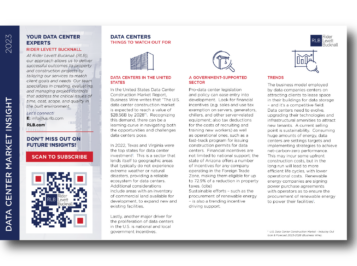Offering you the level of certainty you need to make critical, real-time decisions to ensure the commercial success of your data center projects.
At RLB, our approach allows us to deliver successful outcomes to property and construction projects by tailoring our services to match client goals and needs. Our team specializes in creating, evaluating, and managing project controls that address the critical issues of time, cost, scope, and quality in the built environment. In this insight we cover the state of the sector domestically and abroad, trends, as well as what incentives to keep an eye out for before engaging in your project.
Things to watch out for
Data Centers in the United States
In the United States Data Center Construction Market Report, Business Wire writes that “The U.S. data center construction market is expected to reach a value of $28.56B by 2028” (U.S. Data Center Market Report). Recognizing this demand, there can be a learning curve in navigating both the opportunities and challenges data centers pose.
In 2022, Texas and Virginia were the top states for data center investment (U.S. Data Center Market Report). This is a sector that lends itself to geographic areas that typically do not experience extreme weather or natural disasters, providing a reliable ecosystem for data centers. Additional considerations include areas with an inventory of commercial land available for development, to expand new and existing facilities.
Lastly, another major driver for the proliferation of data centers in the U.S. is national and local government incentives.
A government-supported sector
Pro-data center legislation and policy can ease entry into development. Look for financial incentives (e.g. sales and use tax exemption on servers, generators, chillers, and other server-related equipment; also tax deductions for the costs of recruiting and training new workers) as well as operational ones, such as a fast-track program for issuing construction permits for data centers. Financial incentives are not limited to national support; the state of Arizona offers a number of incentives for any company operating in the Foreign Trade Zone, making them eligible for up to 72.9% of a reduction in property taxes (U.S. Data Center Market Report). Sustainable efforts – such as the procurement of renewable energy – is also a trending incentive driving support.
Trends
The business model employed by data companies centers on attracting clients to lease space in their buildings for data storage – and it’s a competitive field. Data centers need to evolve, upgrading their technologies and infrastructural amenities to attract new tenants. A current selling point is sustainability. Consuming huge amounts of energy, data centers are setting targets and implementing strategies to achieve net-carbon-zero performance. This may incur some upfront construction costs, but in the long run will lead to more efficient life cycles, with lower operational costs. Renewable energy companies are signing power purchase agreements with operators as to ensure the procurement of renewable energy to power their facilities (U.S. Data Center Market Report).
About the charts
The map below represents the world’s data center construction market, as shared by Grand View Research (Data Center Construction Market Size, Share & Trends Report).

What’s driving the market
It is more than the remote workforce that is driving the demand for data centers. “The growing popularity of IoT, the emergence of 5G networks, the adoption of cloud-based services, and the demand for streaming online entertainment content at high speeds are the major factors driving the growth of the U.S. data center construction market” (U.S. Data Center Market Report). Data centers are becoming relevant for entire established business sectors, as well. Financial institutions, government agencies, healthcare providers, transportation/logistics firms, and more are increasingly reliant on technology, needing to store and manage vast amounts of data. The return on investment offered by data centers remains equally strong for well-informed owners and forward-looking communities, and collaborating with an experienced team of advisors is the first step in capitalizing on this burgeoning opportunity.
FURTHER INFORMATION:



